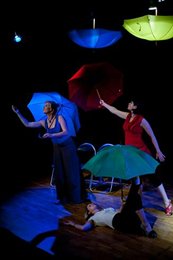An interesting facet of a drama that denounces the falsity of vicarious living is that play-acting itself must be the most vicarious of all professions ever to have evolved. The Secret Life of Me, written by Fregoli Theatre Company’s actors, seems to gloss over this irony, at the same time that they themselves hold that teaching, motherhood and office work (amongst other activities) are to be damned as second-hand existences.
The work is a series of monologues presented by three women; each is a narrative, of sorts. The intertwining speeches describe the forces - the writers argue - that form modern woman: the media dictate how she is to look, think and behave; motherhood is both a sacrifice and a ‘strange kind of masochism’; bosses are male and ‘dicks’ and force her into a form of prostitution; she inhabits a “slip-road that has become my life” and only “my loneliness is mine”. In one of the play’s most engaging moments, Maria Tivnan enjoys declaiming some of the greatest lines spoken by heroines from theatre history - heroines who all end up unhappy or mad or dead or an accumulation of all those states. Then Fregoli’s optimistic opera singer both literally and figuratively finally hits her top note, but even this aria ends with words from the opera Gianni Schicchi: “I fret and suffer torments. Oh God, I would rather die…” Ultimately, the play seems to posit that life has treated these characters unfairly and “it’s not going to stop until you wise-up.”
 The monologues are thematically linked, but narratively separate. There is no explicit dialogue between performers. The women are all connected by experience (identified by choreographed shared actions) but also isolated. In every other novel, film or play of similar structure, from Short Cuts through Crash to the recent Let the Great World Spin, audiences have become accustomed to events, seemingly separate at the opening, eventually converging in the finale. Thus, when director Rob McFeely cleverly creates moments of occasional synchronicity of music, song, movement or exclamation between the performers, it is intriguing. For a moment, the audience are encouraged to see the women as sharing the same story and being connected to each other more closely than just by a shared ideology. Yet there is not the satisfying narrative connection at the conclusion which had seemed to be hinted at. Perhaps the writers would feel such narrative neatness to be crass and popularist, or maybe the creative process meant that the three monologues were formed very separately, but Fregoli reject the opportunity to link the three stories more closely.
The monologues are thematically linked, but narratively separate. There is no explicit dialogue between performers. The women are all connected by experience (identified by choreographed shared actions) but also isolated. In every other novel, film or play of similar structure, from Short Cuts through Crash to the recent Let the Great World Spin, audiences have become accustomed to events, seemingly separate at the opening, eventually converging in the finale. Thus, when director Rob McFeely cleverly creates moments of occasional synchronicity of music, song, movement or exclamation between the performers, it is intriguing. For a moment, the audience are encouraged to see the women as sharing the same story and being connected to each other more closely than just by a shared ideology. Yet there is not the satisfying narrative connection at the conclusion which had seemed to be hinted at. Perhaps the writers would feel such narrative neatness to be crass and popularist, or maybe the creative process meant that the three monologues were formed very separately, but Fregoli reject the opportunity to link the three stories more closely.
A script describing the frustrations of women in a world that favours men may be familiar territory but McFeely and Fregoli pull out all the dramatic stops available to a compact company of eight, and most of their endeavours are successful: simple and effective use of props (umbrellas and newspapers); strong performances from all three actors; singing; careful and engaging writing; and, above all, quirkily original live music from Donal McConnan and Anna Mullarkey (sounding as if a sultry ménage of Björk/Billie Holiday/Phillip Glass got together at the Wickerman Festival). Less effective, however, is the troupe’s dance work: the lack of experience here jars with the more natural and polished acting throughout. At the same time, too, humour is rather meanly doled out. It is as if the world is critical enough of the characters and a little self-deprecation cannot be afforded.
Whilst sections do feel a little didactic, Fregoli handle their home-crafted material with refreshing enthusiasm and commitment and this intimate presentation, well suited to the small space of a studio theatre, certainly engages.
Matthew Harrison is an English Teacher at Coláiste Iognáid, Galway and a regular contributor to arts programmes on RTÉ.